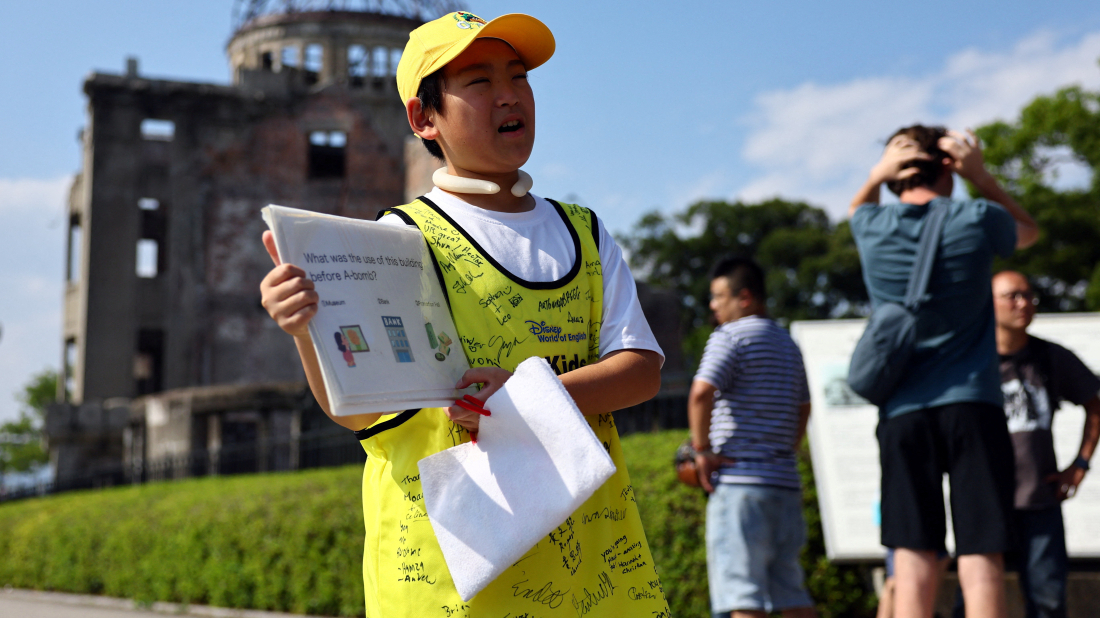Ukraine's Zelenskyy says ‘more readiness’ for next trilateral meeting, as Geneva talks conclude
U.S.-mediated talks on the Russia–Ukraine war concluded in Geneva on Thursday, with Ukrainian President Volodymyr Zelenskyy describing the outcome a...

Twelve-year-old Shun Sasaki walks the paths of Hiroshima Peace Memorial Park with quiet determination, guiding tourists from around the world through the city’s scarred past in the hope of preserving its memory.
Since the age of seven, Shun has been offering free English-language tours of the park, wearing a yellow vest with the message "Please feel free to talk to me in English!" across the back.
His mission is simple: to ensure the horrors of nuclear war are never forgotten.
“I want them to come to Hiroshima and know about what happened at Hiroshima on August 6,” he said in English, speaking ahead of the upcoming 80th anniversary of the atomic bombing. “I want them to know how bad is war and how good is peace. Like... instead of fighting, we should talk to each other about the good things of each other.”
The experience is deeply personal.
Shun’s great-grandmother, Yuriko Sasaki, was a 'hibakusha' — a survivor of the atomic bomb. At the time of the blast in 1945, she was a young girl, just 1.5 kilometers from the hypocentre.
Their house collapsed in the explosion, and Yuriko was buried under debris.
“She was not burnt, but she was affected by the radiation,” Shun’s grandfather, Kazuyoshi Sasaki, recalled.
Yuriko lived until the age of 69, having survived breast cancer and later dying of colorectal cancer in 2002.
Shun, who has guided about 2,000 visitors, prepares for each tour by flipping through old photographs with his grandfather, learning and retelling the story of his family's survival.
He leads visitors past the Atomic Bomb Dome, the Peace Bell, and monuments scattered across the park, handing out folded paper cranes—a traditional Japanese symbol of peace.
“To hear that about his family, his mother, his grandmother, his great-grandmother was a survivor, it surely wrapped it up, brought it home, and made it much more personal. So it was outstanding for him to share that,” said Chris Lowe, a Canadian tourist who joined one of Shun’s tours. “Twelve years old, what he is doing is amazing. The kid is outstanding, well-spoken, very thoughtful. So, I highly commend him for what he is doing. It’s amazing. It really is.”
This year, Shun has been selected as one of two children to speak at the city’s official commemoration ceremony on August 6—a major event marking eight decades since the bombing.
For him, continuing these tours is a long-term goal. “The most dangerous thing is to forget what happened long time ago… so I think we should pass the story to the next generation and then never forget it, ever again,” he said.
On August 6, 1945, at 8:15 a.m., an American B‑29 bomber dropped a uranium‑235 bomb, nicknamed “Little Boy”, over Hiroshima.
The blast instantly killed around 78,000 people, and by the end of 1945, the death toll had risen to approximately 140,000, due to radiation exposure and injuries.
Three days later, on August 9, the United States dropped a second bomb—“Fat Man”, a plutonium‑239 weapon—on Nagasaki.
The death toll from heavy rains and flooding in Brazil’s Minas Gerais state has risen to 46, authorities said, with 21 people still reported missing. The storms triggered landslides and widespread flooding, displacing thousands across Juiz de Fora and Uba.
UK police have concluded searches at Andrew Mountbatten-Windsor’s former residence in Windsor Great Park as part of an investigation into alleged misconduct in public office.
The U.S. Embassy in Jerusalem says it will provide on-site passport and consular services to settlers based in the West Bank on Friday 27 February. The move marks the first time American consular officials have offered such services to settlers, U.S. officials said on Tuesday.
The situation in Cuba was heating up and called for restraint following a deadly incident involving a Florida-registered speedboat off the coast of the Caribbean island, the Kremlin said on Thursday (26 February).
A group of sick and injured Palestinians and their caregivers left Gaza through the Rafah border crossing on Wednesday (25 February) for medical treatment abroad, as limited evacuations continue under tight restrictions.
China’s military said on Friday it had conducted a routine patrol in the South China Sea from 23 to 26 February, accusing the Philippines of “disrupting” regional peace and stability by organising joint patrols with countries outside the region.
Russian Foreign Ministry spokeswoman Maria Zakharova on Thursday (26 February) accused Ukraine of threatening Europe’s energy security by halting oil flows through the Druzhba oil pipeline to Hungary and Slovakia.
U.S.-mediated talks on the Russia–Ukraine war concluded in Geneva on Thursday, with Ukrainian President Volodymyr Zelenskyy describing the outcome as showing “more readiness” for further trilateral diplomacy covering security, economic and political elements of a potential settlement.In his nightly
Iran’s top diplomat said that the next round of nuclear talks is expected in less than a week after what he described as “progress in the most serious exchanges” between Tehran and Washington. The statement follows the third round of nuclear talks on Thursday (26 February) in Geneva.
Mexico’s President Claudia Sheinbaum on Thursday thanked FIFA and its President, Gianni Infantino, for reaffirming that the country’s 2026 World Cup host venues will remain unchanged, following violence that erupted after the killing of a major cartel leader.
You can download the AnewZ application from Play Store and the App Store.

What is your opinion on this topic?
Leave the first comment